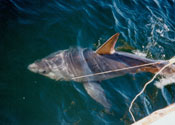Sweeping Action to Save Atlantic Sharks
Federal government moves to strengthen finning ban and close shark fisheries

Washington DC – Ocean Conservancy is applauding proposals by the Federal government’s National Marine Fisheries Service (NMFS) to dramatically cut fishing for overfished Atlantic shark species and improve the existing ban on shark finning - the wasteful practice of slicing off a shark’s valuable fins and discarding the less marketable body at sea. Measures proposed by NMFS would close fisheries for sandbar sharks, protect porbeagle sharks, and require that sharks be landed with their fins attached to ensure full compliance with the finning ban.
“After fourteen years of inadequate limits, the government is at last heeding scientific advice and taking bold steps to safeguard vulnerable Atlantic sharks,” said Sonja Fordham, Director of Ocean Conservancy’s Shark Conservation Program who serves on the NMFS shark advisory panel. “Cutbacks and closures are urgently needed to ensure the survival of these critical ocean predators.”
NMFS predicts that reducing annual catch of sandbar sharks, the dominant species in the Atlantic coastal shark fishery, to roughly 100 tons can rebuild the population within 70 years. The porbeagle shark, a large, oceanic species related to the great white, needs a full century to recover from an 85% decline and would be off-limits under the NMFS plan. Conservationists and scientists have long promoted landing sharks with fins attached as the only sure-fire way to prevent finning; most finning bans are enforced with generous fin to carcass weight ratios that allow fishermen room to fin sharks.
“These changes would give Atlantic sharks a fighting chance and position the United States to lead the world toward an effective, global ban on shark finning, thereby potentially saving millions of sharks,” added Fordham. “Public support is essential to ensuring that strong fishing limits are included in the final shark plan and implemented before it’s too late.”
The proposal is open for public comment until mid-October. Final measures are expected in early 2008.
Sharks are exceptionally vulnerable to overfishing because they generally grow slowly and produce few young. As top predators, sharks help keep ocean ecosystems in balance.
Ocean Conservancy has led U.S. shark conservation efforts since management began in the early 1990s, filing several lawsuits to support science-based cutbacks in Atlantic shark fishing.











